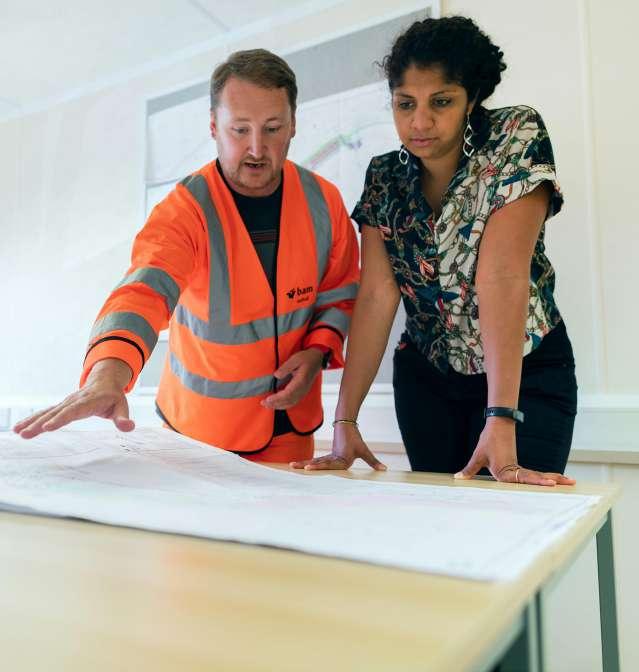Hydrogen Skills Framework
A regional framework for action in Greater Manchester

SECONDARY

PRIMARY







Hydrogen is key to achieving Net Zero emissions by mid-century, with green and blue hydrogen offering a viable alternative to fossil fuels. The UK Hydrogen Strategy (2021) outlined a bold vision that: by 2030, the UK aims to produce 10GW of low carbon hydrogen, unlocking up to 100,000 jobs and £13 billion in GVA by 2050. However, this vision hinges on a critical challenge: building the skilled workforce needed to deliver this ambition.
The growing skills gap in the green energy sector is not just a hurdle - it’s an opportunity. Investing in hydrogenfocused skills programmes is essential to future-proofing the workforce, empowering those entering the labour market, and equipping existing talent to adapt to this transformative sector. Public awareness of hydrogen’s potential is equally vital, as better understanding paves the way to sustainable careers and innovation.
Greater Manchester and the North West are at the forefront of this transition, setting a goal to achieve Net Zero by 2038 through flagship initiatives such as Trafford Green Hydrogen and HyNet North West, which showcase leadership in practice.
To accelerate this progress, Hydrogen Safe has developed the Hydrogen Skills Framework - a collaboratively designed roadmap that addresses the region’s urgent skills needs in the hydrogen sector.
This framework provides an analysis of Greater Manchester’s labour and skills market. However, rather than focus exclusively on primary industries, it delivers a detailed evaluation that profiles occupations across the entire hydrogen value chain - production, distribution, consumption, cross-cutting, safety and enabling.
Local case studies and actionable insights highlight pathways to close the skills gap through collaboration between industry, academia, and government. It prioritises public engagement, fostering future talent through schools, outreach, and hands-on demonstration projects.
Despite challenges such as high costs and supply chain fragmentation, Greater Manchester’s strong governance and hydrogen strategy position it to lead the UK in overcoming these barriers. By linking educational institutions with industry, this framework establishes a robust hydrogen skills ecosystem, driving innovation, economic growth, and energy security
The Hydrogen Skills Framework is more than a regional initiative - it’s a blueprint for building a scalable, sustainable hydrogen economy that not only powers Greater Manchester’s Net Zero ambitions, but can also be used as a national template, setting the standard for success to become a global leader for the hydrogen economy.
Hydrogen is a clean, transformative energy solution and a vital alternative to methane, also known as natural gas. As the most abundant chemical element in the universe, hydrogen offers enormous potential when harnessed effectively. Unlike methane, hydrogen produces no carbon dioxide emissions when burned or used in fuel cells.
The UK’s Hydrogen Strategy emphasises two leading low-carbon production methods: green hydrogen (produced using renewable energy) and blue hydrogen (produced via Carbon Capture, Utilisation, and Storage (CCUS)). Blue hydrogen serves as a critical stepping stone, facilitating the development of infrastructure and frameworks needed to scale green hydrogen production, unlocking the full potential of this zero-carbon energy source.
Hydrogen is poised to become a cornerstone of the UK’s Net Zero transition. However, realising this potential requires a robust and skilled workforce, capable of meeting the demands of a growing hydrogen economy. Government initiatives such as Skills England and the Office for Clean Energy Jobs aim to address this challenge.
Skills England, an arms-length body currently in shadow form within the Department for Education, is central to the government’s mission to meet the skills needs of the next decade. Its first report, Skills England: Driving Growth and Widening Opportunities, published in September 2024, identified hydrogen as a key growth sector in the transition to Net Zero. It highlighted the urgent need to expand the greenskilled workforce to meet rising demand.
The Office for Clean Energy Jobs, situated within the Department for Energy Security and Net Zero, collaborates with trade unions, industry, and educational institutions to ensure the workforce is equipped to deliver on the UK’s Clean Energy Mission. By working with Skills England, the Department for Education, and other stakeholders, the Office for Clean Energy Jobs supports skills assessments and implements targeted policy solutions, including those for hydrogen.
Why a Framework?
The Hydrogen Skills Framework delivers a regional roadmap to identify and support the workforce required to power the hydrogen economy. It provides detailed occupational profiles across the primary
and secondary hydrogen sectors, spotlighting roles in need of investment, policy support, and training provision.
This framework is designed to drive collaboration among stakeholders, creating a shared vision for hydrogen workforce development. It addresses funding challenges by highlighting critical areas across the skills value chain. For every occupational profile, it outlines role maturity levels and identifies key workforce segments essential to building the hydrogen economy.
While national initiatives like the Hydrogen Skills Alliance aim to build overarching frameworks, we wanted to take a regional approach to ensure the framework could offer tailored solutions that reflect local labour and skills needs. By following a regional model, we want to align with and support national efforts, whilst minimising duplication and emphasising coordination across the hydrogen sector.
Why Greater Manchester?
Greater Manchester (GM) stands as a national exemplar in hydrogen innovation, leveraging strong policy frameworks, local agility, and a place-based agenda to accelerate Net Zero goals. As one of the UK’s first devolved regions, GM is uniquely positioned to respond effectively to labour market demands.
The region’s leadership in hydrogen is underscored by its approved Hydrogen and Fuel Cell Strategy and broader environmental policies. According to the Greater Manchester Combined Authority’s (GMCA) 5-Year Environmental Plan, GM aims to produce 800 GWh of low-carbon hydrogen by 2030, reducing emissions by an estimated 1 MtCO₂e. These ambitious targets highlight GM’s commitment to energy security, skills development, and economic growth.
The Hydrogen Skills Framework integrates GM’s labour and skills markets, creating a comprehensive ecosystem for workforce deployment. By aligning local innovation with national objectives, GM is leading by example for a scalable, sustainable hydrogen economy that positions the region—and the UK as a whole—as a leader in clean energy transformation.


Below we outline the actions required to achieve the hydrogen skills ambitions for the region. These points emphasise the critical role of strategic coordination, investment, and public engagement in advancing the UK’s hydrogen skills agenda.
Strategic Alignment and Collaboration:
Initiatives like Skills England and the Hydrogen Skills Framework are critical for aligning national and regional labour market needs with the Net Zero economy. This collaboration is vital to building a workforce equipped to meet the demands of the hydrogen economy.
Leveraging the National Wealth Fund: The National Wealth Fund has the potential to revolutionise hydrogen skills and infrastructure development by de-risking investments. However, questions remain about its ability to compete globally and sustain long-term commitment to the hydrogen economy.
Tackling Challenges in the Hydrogen Economy:
High production costs and fragmented supply chains are significant barriers. Early adoption by key industry leaders is crucial to reducing costs, stabilising infrastructure, and making hydrogen a viable competitor to traditional energy sources.
Bridging Skills and Education Gaps:
Moving from strategy to action is imperative. The disconnect between educational institutions and industry needs, particularly in the emerging hydrogen sector, must be addressed to ensure the sector’s growth and success.
Driving Public Awareness and Engagement:
Building public understanding of Net Zero skills and hydrogen technology is essential. Engaging young people — and their families — is a cornerstone for cultivating future talent and interest in the hydrogen sector.
Breaking Down Barriers:
What’s holding hydrogen technology back? Identifying and addressing obstacles — whether technological, regulatory, or financial — is essential to unlocking the full potential of this transformative energy source.
During the development of our Hydrogen Skills Framework, we uncovered a number of key challenges when it comes to establishing a hydrogen economy from a perspective of skills.
Skills Transfer and Upskilling:
The review found that the current skills landscape is well established and largely capable of transition to a hydrogenbased economy, but with some infilling (updating and new) skills required for various roles across the hydrogen value chain and mapping them across all occupational sectors.
Upskilling Existing Labour Market:
With the emergence of the hydrogen economy, there will be a need for existing industries to train and upskill as new infrastructure and repurposed existing networks adopt hydrogen which will impact occupational profiles.
Challenge on Unknown Skills for Education, Industry and Local Authorities:
The hydrogen industry will not only affect occupational profiles in the primary hydrogen value chain, all occupational sectors will be impacted in some way. This creates a challenge for those who need to understand how roles will be impacted and how and when they should transition into the hydrogen economy.
Challenges in Attracting New Entrants:
The ageing workforce and the lack of new recruits into technical roles within the hydrogen value chain were identified as significant challenges. The industry needs to make itself more appealing to potential entrants to address capacity demands.
Retaining Skills in the Labour Market:
There is a need to plan programmes for those that are approaching retirement age to ensure that their technical skills and expertise are retained within the hydrogen industry.
Distribution of Skills Funding for Local Authorities:
Skills shortages are already visible in the hydrogen sector, and this will only intensify once the backlog of CCUS and electrolytic hydrogen projects enter the construction and operation phases. There is a critical need local and combined authorities to allocate sufficient funding for up-skilling and retraining, as well as collaborating with educational initiatives and institutions to create clear career transition pathways for the hydrogen sector.


We have carefully selected each section of our Hydrogen Skills Framework as a means of making it clear and easy to use by anyone. We start with Our Shared Vision, ensuring a collective mindset among businesses, educators and individuals.
This exercise is designed to guide organisations in asking the right questions when developing a tailored hydrogen skills plan. To streamline this process, we’ve included a decision tree that navigates critical areas: Strategic Leadership, Accountability, and Sustainability
Here’s why each element is essential:
• Strategic Leadership: Successful Net Zero transitions require a clear understanding of hydrogen’s impact on a company’s operations, products, services, and workforce roles. Leadership must drive this transformation.
• Accountability: Organisations need clarity on their strategic priorities and the ability to communicate them effectively to stakeholders. A dedicated, actionable plan—supported by financial data—ensures alignment between training investments and broader business goals.
• Sustainability: Framing skills and education investments as part of a whole-system Net Zero transition is critical. This includes not only adopting hydrogen technologies but also developing the workforce to deploy and maintain them.
Next, we define occupational profiles across the hydrogen value chain, categorising roles within the UK’s 19 occupational sectors. We’ll show where the biggest transformations will occur, breaking sectors into primary sectors (core to hydrogen deployment) and secondary sectors (supporting and adjacent) categories. Each role’s skills evolution will be clearly mapped using a traffic light system, highlighting jobs that will encounter significant change.
We’ll also spotlight regional examples, using local case studies to showcase Greater Manchester’s industry leaders and pinpoint the region’s most pressing skills gaps. Finally, we present recommendations and conclusions, distilled from insights shared by stakeholders during our roundtables leading up to the development of this Hydrogen Skills Framework.
These actionable takeaways will provide clear guidance for accelerating hydrogen skills development and seizing the opportunities of the hydrogen economy.
Do you feel like you have the support from within your organisation to fully understand what is required to successfully transition to Net Zero?
Are you confident that your business can integrate Net Zero, and specifically hydrogen skills, into all relevant functions within your business?
Do you think your business is future-proofed for the Net Zero transition?
We understand the Net Zero agenda and what this could potentially mean for the different functions of the business.
There is high level of support within the business for achieving Net Zero.
We have experience and expertise in developing a skills framework for our staff.
The Net Zero agenda is aligned to the strategic priorities of the business.
We can identify key risks and evaluate the potential impact of not training the workforce towards Net Zero.
We can interpret budget impact on the Net Zero transition and ask relevant questions.
We understand how the organisation’s current training provision meets the needs of all staff.
We understand how to engage with stakeholders about Net Zero transition staff and the wider stakeholders and how this can inform decisions.
We understand what resources we need to deliver Net Zero in our business.
We have a culture open to influencing key issues (through communication, appropriate challenge, awareness raising or developing policies and practices). Has your organisation failed to meet any of the statements mentioned above?
We learn from other businesses that have already taken critical steps to meet Net Zero expectations.
Our business has a full understanding of the Net Zero transition, specifically around people and skills.
Our business understands the future skills needs for the Net Zero transition.
Our business has established a clear timeline for implementing the Net-Zero transition.
Use exercise above to create your organisation’s own Shared Vision


•
•
•
AGRICULTURE, FORESTRY & FISHING
HGV Specialist Engineer
SKILLS CHANGE:
• Transition to servicing fuel
•
•
•
• Manage pipeline networks for transporting hydrogen to remote mining sites, optimise refuelling logistics and mitigate risks associated with hydrogen flammability
SKILLS CHANGE:
• Assembling storage tankers for hydrogen and hydrogen-derived products like ammonia
• Knowledge of advanced materials suitable for high-pressure or cryogenic hydrogen storage as well as precision assembly techniques to ensure structural integrity and safety
•
Automation Engineer
• Automation in hydrogen-powered vehicle repair shops will involve creating efficient systems for handling fuel cells, refuelling stations and integrating hydrogen-powered vehicles into existing workflows
• Work on advanced robotics and automation for maintenance tasks, optimising safety and sustainability in hydrogen-related processes
•
• Collaborate with engineers to adapt inspection protocols
•
• Recommend energy-efficient upgrades and focus on ensuring
and
•
•
•
• Reducing Scope 3 emissions, particularly in areas like transport, for entertainment companies such as
• Advise on adopting hydrogen-powered vehicles for employee transport and logistics, ensuring significant reduction in carbon footprints
• Evaluate environmental impact of hydrogen infrastructure, and recommend best practice for integrating hydrogen solutions into daily operations
•
•
& STORAGE
SKILLS CHANGE:
equipment functionality
• Assist in educating customers on the refuelling process and hydrogen vehicle maintenance which will require expertise in hydrogen safety standards and knowledge of hydrogen technology




• Adapt to workings on hydrogen-powered vehicles, including Fuel Cell Electric Vehicles (FCEVs)
•


•
• Using real-time data, model data to identify trends in energy demand, supply, and
• Gather evidence to determine the best times for hydrogen production using renewable energy sources to align with periods of low electricity demand or high renewable energy output to ensure cost-effective, sustainable hydrogen production, supporting integration of hydrogen into the broader energy system
•
•
• Source materials and technologies essential for organisations wanting to use hydrogen
• Negotiate contracts with suppliers of hydrogen and renewable energy technologies to ensure cost-effectiveness and sustainability
• Work closely with risk management teams to evaluate the financial viability and insurance needs of hydrogen offtakers
•
potential in reducing carbon emissions and transforming industries
• Promote awareness of green energy solutions through interactive displays and public engagements, blending art and science to inspire action and understanding of the hydrogen sector
AGRICULTURE,
SKILLS
•
•
•
sites meet safety and compliance standards
• Analyse the environmental and operational impact of hydrogen technologies, providing detailed evaluations to support insurance coverage for retail hydrogen refuelling stations
MANUFACTURING
SKILLS
•
•
& STORAGE
• Evaluating hydrogen storage facilities, transportation infrastructure, and refuelling stations for safety hazards such as leaks, high-pressure failures, and embrittlement
• Collaborate with engineers and regulatory bodies to ensure compliance with safety standards and develop emergency response protocols
• Analyse financial and operational risk of adopting hydrogen-powered vehicles and systems
HOSPITALITY & CATERING
SKILLS CHANGE:
• Ensure hydrogen-powered appliances such as ovens and stoves meet safety standards
• Verify that food-grade CO2, sourced from CCUS technologies, used in preservation or carbonisations processes is sourced responsibly
• Assess the storage, handling and safety protocols for both hydrogen and CO2 to prevent contamination or accidents
SKILLS CHANGE:
• Ensure suppliers meet environmental and quality standards, including compliance with sustainability regulations
• Assess long-term viability of hydrogen infrastructure projects, considering factors like cost-effectives, efficiency and supply chain reliability
• Collaborate with stakeholders to procure equipment that supports the transition to low-carbon energy
•
•
•
•
•
•
SKILLS
•
•
•
•
•
•
•
•
•
AGRICULTURE, FORESTRY & FISHING
Defra Scientific Officer
SKILLS CHANGE:
• Research hydrogen applications in sustainable farming practices and build evidence for policies addressing food security, analysing hydrogen’s role in reducing emissions while maintaining productivity
• Assess atmospheric emissions from hydrogen production and use which will be critical to ensure environmental balance
• Collaborate with stakeholders to drive innovation in low-carbon technologies, provide scientific guidance to align sector policies with national climate goals
•
and equipment
and efficiency
• Support the development of hydrogen storage solutions, such as
•
• Promoting hydrogen-powered vehicles, fuel cell systems and related components, requiring in-depth technical knowledge to educate customers about hydrogen’s
• Representatives must understand hydrogen infrastructure and collaborate with businesses transitioning to hydrogen technologies
• Adapting to new regulations and incentives will be vital for effective sales strategies
CHANGE:
• Operate hydrogen-powered buses, requiring training on fuel cell systems and safety protocols for hydrogen refuelling
• Familiarity with hydrogen refuelling stations and emergency procedures specific to hydrogen-powered vehicles will be essential
• Routes and schedules might adapt to align with availability of hydrogen refuelling infrastructure
•
HOSPITALITY & CATERING
SKILLS CHANGE:
• Kitchens may transition to hydrogen-fuelled stoves and ovens, requiring chefs to adapt cooking techniques to this source
• Knowledge of operating and maintaining hydrogen-powered equipment
• Sustainability-focused establishments may promote hydrogen as part of their green initiatives, requiring chefs to align with these values through eco-conscious menu planning and waste management
• Hydrogen’s role in reducing carbon footprints may inspire chefs to educate patrons about its benefits, integrating environmental awareness into the dining experience

•


•
•

•
•
•
•
•
storage and transportation solutions
• Investigate the environmental impact of hydrogen adoption across various industries, identifying ways to reduce carbon emissions and enhance sustainability
• Collaborating with governments, industry leaders, and academic institutions , they will contribute to shaping hydrogen policy and innovation
&
CHANGE:
• Work closely with the civil service to craft strategies for integrating hydrogen into the national energy framework, ensuring alignment with broader sustainability goals
• Assess economic, environmental, and social implications, providing recommendations on funding, regulation, and incentives to encourage hydrogen industry growth
& STORAGE
SKILLS CHANGE:
• Plan and implement hydrogen-powered solutions as part of an integrated transport system using diverse technologies like electric and biofuel alongside hydrogen
• Oversee hydrogen infrastructure development and ensure compatibility across freight, public and private transport
• Collaborate with policymakers and industry leaders to secure investments and address regulatory challenges
& CATERING
SKILLS CHANGE:
• Oversee the integration of hydrogen-powered systems, such as energy-efficient kitchen equipment and sustainable heating solutions, into customer-facing operations
• Educate staff and customers about the environmental benefits of hydrogen, addressing public awareness
• Address inquiries and feedback on the transition to hydrogen
AND
SKILLS CHANGE:
• Oversee the decommissioning of legacy energy infrastructure, such as oil and gas plants, while ensuring the smooth transition to hydrogen-powered systems
• Managing the safe removal of equipment, mitigating environmental impacts, and implementing sustainable practices
• Work closely with government to align decommissioning strategies with national hydrogen policies, ensuring compliance with regulatory standards
• Coordinate the repurposing of assets for hydrogen use
SKILLS CHANGE:
• Work with local authorities and gather data on skills gaps in the emerging hydrogen economy, informing curriculum development and refinement to meet local
• Unlocking funding for training and development initiatives, to ensure the
is equipped to support the growth of the
ENERGY GENERATION, PRODUCTION AND SUPPLY
SKILLS CHANGE:
• Navigate the complex legal frameworks required for hydrogen projects to achieve Final Investment Decision (FID), crafting detailed contracts with governments to address funding, compliance, and risk-sharing
• Handle regulatory approvals, intellectual property for innovative hydrogen technologies, and agreements on supply chains and infrastructure
• Ensure projects align with international trade laws and sustainability mandates, facilitating partnerships and mitigating legal risks
CHANGE:
• Report on advancements in hydrogen technologies, its impact on energy transitions, and its role in addressing climate change
• Investigate the economic, environmental, and geopolitical implications of hydrogen adoption, explaining complex topics to diverse audiences
• Highlight successful stories, scrutinise policy developments, and analyse global markets
• Collaborate with experts to produce in-depth features and multimedia content, ensuring public understanding and engagement with hydrogen’s potential to reshape industries and contribute to a Net Zero future Sustainability
CHANGE:
• Responsible for ensuring public hospitals meet environmental regulations
• Oversee the adoption of hydrogen-powered systems for heating, transport, and energy generation, reducing carbon footprints and improving air quality
• Lead public health initiatives, demonstrating how hydrogen can contribute to cleaner air and a healthier environment
• Engage with local communities to address concerns and opportunities related to water-intensive hydrogen production processes, ensuring transparency and trust
• Facilitate dialogue on how hydrogen projects impact water resources, recycling, and waste management
• Educate communities about the environmental benefits of hydrogen, building partnerships between stakeholders and advoca for equitable resource distribution and community participation in hydrogen-related initiatives
• Oversee projects integrating hydrogen-powered machinery and energy-efficient systems into construction processes
• Collaborating with trade associations offering specialised hydrogen training for members, ensuring workforce upskilling to meet industry demands
• Coordinate with stakeholders on hydrogen infrastructure development, ensuring compliance with evolving standards and regulations
• Prioritise funding allocations for hydrogen projects to align with the ambitions of the UK Hydrogen Strategy
• Outline subsidies, tax incentives, and grants to accelerate hydrogen adoption
• Collaborate with financial institutions to encourage investment in hydrogen infrastructure, while also addressing insurance frameworks for emerging risks
• Foster economic confidence and support innovation for the Net Zero economy
• Manage public relations and communications for hydrogen-related projects and engage in public consultations, especially for projects like new onshore windfarms, addressing community concerns and countering NIMBYism (Not In My Backyard) by highlighting the environmental and social benefits of hydrogen and renewable energy integration
• Ensure smooth project approvals and encourage community support for sustainable energy solutions
• Promote sustainability and eco-friendly initiatives by showcasing hydrogen technologies used in events, performances, and entertainment venues
• Collaborate with brands and organisations in the hydrogen sector to raise awareness about the environmental benefits of hydrogen
• Educate followers on the importance of transitioning to clean energy and also the career opportunities for the future workforce
SKILLS CHANGE:
• Lead national efforts to integrate hydrogen as a key component of energy policy, ensuring its role in achieving carbon neutrality and enhancing energy security

• Champion investments in hydrogen infrastructure, fostering international collaboration and trade agreements to strengthen the hydrogen economy
• Oversee regulatory frameworks, set ambitious targets for hydrogen adoption, and ensure public and private sector alignment
• Address challenges related to innovation, workforce development, and sustainability



Arcadis is a global sustainable transformation partner, delivering intelligent products and solutions to the challenges of climate, energy affordability and liveable cities.
With a global energy transition strategy in place, the company has invested in specialist Energy Transition training that will ensure its 45k global employees have the knowledge of hydrogen and the alternative fuels they need in supporting client organisations to decarbonise.
In order to achieve this, a bespoke e-learning module has been developed and launched in partnership with Manchester-based Hydrogen Safe.
“The training we have developed through our Energy Transition Academy and Community of Practice initiatives complements the wider work we are doing to accelerate the deployment of decarbonised Hydrogen & Alternative Fuels solutions.”
“We have some very talented individuals at Arcadis, however the move to new and innovative technologies in support of the Energy Transition means we must place emphasis on upskilling to ensure we utilise the transitional skillsets our teams have across the company to access and support the opportunities this presents.”
PAUL ASPINALL, Arcadis Global Hydrogen Lead



It has been developed by Carlton Power with the support and involvement of a local consortium, comprising Manchester Metropolitan University, Greater Manchester Combined Authority (GMCA), Trafford Council, Cadent Gas and Electricity North West.
The Trafford scheme will use renewable electricity to produce green hydrogen fuel, primarily for industry, with scope to expand and service transport. In the first instance, it will supply industrial and manufacturing facilities in the Greater Manchester region, enabling sectors that are difficult to decarbonise to move away from fossil fuels.
Supported by funds from the Government’s first Hydrogen Allocation Round (HAR1), phase one would be supported by c£30m and, subject to a final investment decision, its construction is scheduled to start in 2025.
This scheme will be among the very first green hydrogen projects to be built in the UK.



Deloitte is one of the world’s leading professional services networks.
Providing world-class audit and assurance, tax and legal, consulting, financial advisory and risk advisory services across more than 20 industries.
As Honorary Consul of Japan in Manchester, Deloitte’s Senior Practice Partner for the North West, Jo Ahmed, worked with partners from Deloitte Japan to enable a critical introduction to Panasonic during a Greater Manchester Combined Authority-led delegation to its Panasonic HX facility in Kusatsu.
Just six weeks after the visit, a Memorandum of Understanding was signed between Panasonic and Greater Manchester Combined Authority (GMCA), Manchester Metropolitan University, SSE Energy Solutions, Electricity North West and Carlton Power.
In a bid to prove that Panasonic HX Hydrogen Fuel Cell technology can work in practice, Deloitte has provided
a Project Management Office (PMO) function within the working group to include all partners.
It has also taken the lead for the site selection process, taking into consideration technological, planning, environmental and social value matters to support the working group in arriving at preferred locations.
As a pioneering partnership, Greater Manchester is now England’s first use case for Panasonic’s hydrogen fuel cell technology, highlighting the region’s ambitions and international approach to carbon cutting.
Over the next six years it is hoped the partnership will strengthen research and innovation clusters, connecting people and ideas, and attracting investment. Through meaningful change, the plans for the partnership are to deliver jobs and growth, while moving Greater Manchester closer to its net zero goals.
“Coming together on the international stage is really important, because it means we speak with one clear voice, representing our region and its ambitions.”
“When you combine the public sector’s diplomacy and consensus-building skills, commercial industrial expertise and Deloitte’s international business perspective and network of clients, you have a really strong team.”
JO AHMED, Deloitte’s Senior Practice Partner for the North West


Hydrogen economy: distribution, consumption, safety, cross-cutting, enabling
IACS Ltd, is a leading inspection, engineering, and testing consultancy, specialising in pipeline construction.
In 2023, IACS announced a multi-millionpound investment in people and skills development with the launch of IACS Training and Education to address the skills gap and support the urgent need for pipeline inspectors within the energy sector.
The ‘Practitioner in Pipelines for Hydrogen and Utilities’ Apprenticeship
was devised through a strategic partnership between IACS Training and Education, Hopwood Hall College and University Centre and Hydrogen Safe.
Welcoming its second cohort in 2025, the company has shown how a progressive approach can futureproof talent and create new business pipelines supported by the economic opportunities that a shift to green energy will provide.
“Our single focus is to develop highly skilled tradesmen and women who will be able to confidently contribute to the green energy sector.”
“This employer-led initiative marks a significant investment by our business as we aim to meet with local and worldwide demand for our highly skilled personnel. We are operating at a time of huge investment in the infrastructure for utilities, principally here in the UK, but also globally.”
“Together with Hopwood Hall College and University Centre and Hydrogen Safe we are supporting a new generation of pipeline inspectors, whilst equipping our apprentices with the green skills they will require to have a long and fulfilling career.”
JAMES BAKER, Director at IACS Training & Education



Addleshaw Goddard is a leading legal adviser in cutting-edge energy projects.
It has advised across the value chain in relation to hydrogen, including on: hydrogen production projects; carbon capture use and storage (CCUS); renewable power purchase agreements (PPA) to aid production; hydrogen supply and offtake arrangements; the Low Carbon Hydrogen Agreement; regulatory changes necessary to facilitate the hydrogen economy; and hydrogen focussed construction, property and planning arrangements.
This work will support hydrogen projects both in the North West and more generally (via e.g. support for HAR projects and industrial clusters), as well as helping to shape the future regulatory framework – e.g. advice to regulators on necessary regulatory changes and funding structures.



A world-leading hydrogen production and distribution system, production in Ellesmere Port near Chester will feed into a pipeline stretching across to Carrington in Greater Manchester, providing industry and power stations with a pathway to net zero.
Later phases will extend into Trafford Park and elsewhere across the region. In addition to combatting climate change, with up to 10 million tonnes of carbon dioxide emissions avoided every year, it is estimated that over 10,000 jobs will be created during the construction of HyNet’s hydrogen projects. Furthermore, companies connecting to HyNet’s hydrogen ecosystem employ over 2,000 people directly or in the supply chain whilst companies connecting to HyNet’s hydrogen ecosystem employ over 2,000 people directly or in the supply chain.
According to the Greater Manchester Chamber of Commerce’s (GMCC) most recent Local Skills Improvement Plan (LSIP), seven key growth sectors have been identified within Greater Manchester, as outlined by local authority growth plans:
The GM Labour Market & Sector Insight Pack builds on this analysis by incorporating additional sectors, including:
This reinforces the critical need for hydrogen-related skills in the region to support these growing sectors.
“While a sector specific focus has often been the default, this framework goes one step further, providing details of the job roles that we need to consider now and for the future.
“Furthermore, it explores primary and secondary hydrogen sectors, which shares the real opportunity that embracing a transition to green energy will deliver for Greater Manchester and the wider region.”
JOE CROLLA, Acting Principal Skills Manager at Greater
Manchester
Combined Authority

“Lorem ipsum dolor sit amet, consectetur adipiscing elit, sed do eiusmod tempor incididunt ut labore et dolore magna aliqua. Ut enim ad minim veniam, quis nostrud exercitation ullamco laboris nisi ut aliquip ex ea commodo consequat.
Duis aute irure dolor in reprehenderit in voluptate velit esse cillum dolore eu fugiat nulla pariatur. Excepteur sint occaecat cupidatat, sunt in culpa est laborum.”
JO SMITH, Greater
Manchester Chamber of Commerce

All of these priority growth areas highlighted in both reports have been integrated into the Occupational Sectors section of this Hydrogen Skills Framework.
Public awareness is critical to the success of the hydrogen economy. Without broad understanding and support of the career opportunities and lifestyle changes, the full potential of hydrogen as a clean energy solution for the UK cannot be realised. This section will outline the importance of raising public awareness and detail actionable strategies for engaging communities, inspiring future talent, and creating a positive narrative around hydrogen.
Public education and outreach:
It is important to educate the public about hydrogen technology and its role in the future energy landscape. Individuals need clear, accessible information to help demystify hydrogen and build public trust in its safety and benefits.
Leveraging local media and influencers:
Local media, social platforms, and influencers can be used to amplify the message and reach a broader audience. By telling success stories and showcasing real-life examples of hydrogen technology in action, stakeholders can help raise awareness and generate excitement about the hydrogen economy.
Community engagement:
Effective community engagement is crucial for gaining public support for hydrogen projects. This includes involving local communities in discussions about the potential impacts and benefits of hydrogen initiatives in their areas, ensuring transparency, and addressing any concerns.
Educational initiatives in schools and colleges:
Integrating hydrogen-related content into school and college curricula will increase awareness among younger generations as well as education staff. This approach would not only educate students about hydrogen but also inspire them to consider careers in the green energy sector, thereby building a pipeline of future talent.
Public demonstration projects:
There is a need for implementing public demonstration projects across the UK. These projects would allow the public to see hydrogen technology in action, making the concept more tangible and understandable, and helping to foster a positive perception of the hydrogen economy.
Partnerships with local organisations:
Forming partnerships with local organisations and businesses is key for expanding outreach efforts. By working together, stakeholders can pool resources and expertise to create more impactful awareness campaigns, tailored to the specific needs and concerns of a region’s community.
Based on our findings from the Hydrogen Skills Framework, we have established several recommendations:
Create a Shared Vision:
There must be collaboration between educators and organisations to align training with value chain development, reflecting policy and investment certainty for hydrogen’s role in the energy transition.
Regions and Skills England:
Local and Combined Authorities need to understand hydrogen’s role in making Britain a clean energy superpower in order to allocate skills investment. Skills England will support Local and Combined Authorities to construct skills systems which reflect and feed into both local and national priorities like hydrogen and clean power skills.
Support the Current Workforce:
Deliver tailored, accessible, and contextualised training—such as online, on-the-job or e-module learning—while creating a skilled workforce across the UK.
Facilitate Multiple Training Routes:
Offer multiple pathways for entry into the hydrogen industry, appealing to a wide range of candidates, from school leavers and apprentices to specialists in advanced technologies.
Develop Skills Pathways:
Educators, industry and government must adapt training programmes, certifications, and qualifications to address high-impact occupational shifts. Target investment to ensure both workers and employers are equipped to meet hydrogen economy demands.
Sector Development:
Using the occupational profiles where change has been identified across all occupational sectors, the education market and the private sector must update existing training programmes, standards, qualifications, and degree courses to meet the demands of the hydrogen economy.
Raise Public Awareness:
Deliver campaigns to inspire both the future workforce and those transitioning within the current labour market to pursue careers in hydrogen and clean energy.
Address Gender Diversity:
Within the hydrogen sector, the gender gap still persists. There is a critical need to address disparities from entry to leadership across occupational sectors.
The completion of this Hydrogen Skills Framework marks a pivotal step towards realising the UK’s ambition to become a clean energy superpower. While the consultation period fostered valuable dialogue, its conclusion signals the start of the crucial next phase. The insights gathered from businesses, educators, and stakeholders must now translate into actionable policies that secure long-term investment in skills, technologies, and infrastructure.
Our framework aligns with national initiatives, including Skills England’s policy agenda and commitments outlined in the Plan for Change, by providing a clear roadmap to address the urgent skills gaps in the hydrogen economy. This approach not only supports the UK’s Net Zero targets but also helps to future-proof the workforce for emerging opportunities in the green energy sector.
Hydrogen is uniquely positioned to bridge and integrate key growth sectors—manufacturing, transport, construction, and green energy— while unlocking exponential growth and innovation. Yet, this shared vision will remain unfulfilled without a robust delivery plan, policy certainty, and dedicated funding. Governments, combined authorities, and industry leaders must collaborate to create a skills ecosystem that ensures both local and national priorities are met.
We want to thank all of those involved in the making of the Hydrogen Skills Framework and we look forward to continuing our work at Hydrogen Safe to bridge the skills gap for the UK hydrogen economy. Below is a list of all contributors whose input shaped the final version.


